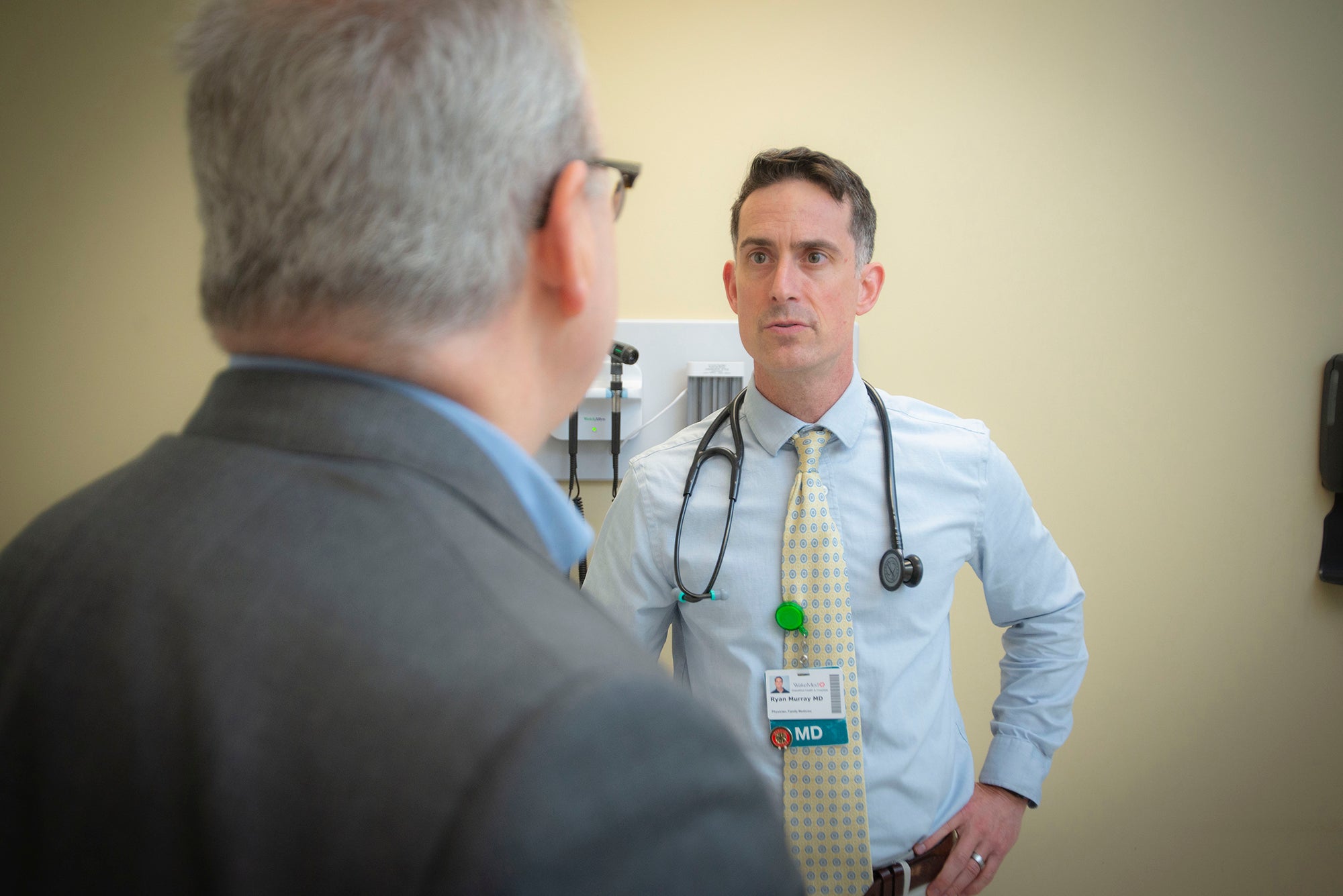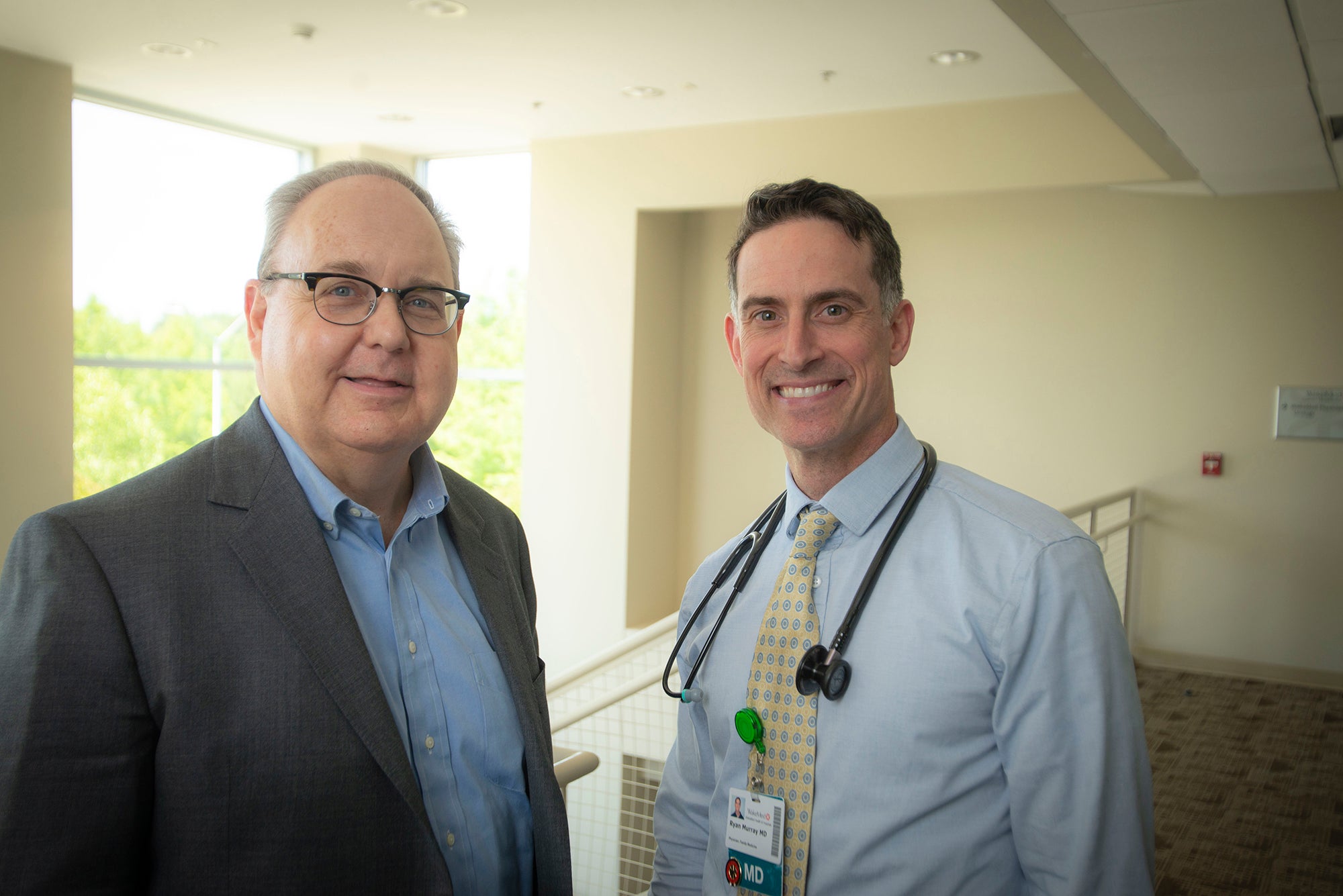Bloodlines: Sherwood Southerland Jr's Story of Fighting Family Cancers
June 19, 2023
By: WakeMed Health & Hospitals
Categories: Cancer Care, Stories
In 1999, at age 38, Sherwood Southerland received a shocking diagnosis. He had colorectal (colon) cancer. Sherwood received genetic testing and underwent surgery and chemotherapy. He was later declared cancer-free.
The years passed, and he received another blow. In 2018, Sherwood’s mother was diagnosed with colon cancer. At this point, doctors saw a concerning pattern and tested Sherwood’s mother for Lynch syndrome, a genetic condition that often leads to colon cancer. She tested positive, so they re-tested Sherwood. He, too, tested positive. Gratefully, Sherwood’s mother beat colon cancer, and she, along with Sherwood, were each scheduled for ongoing, annual colonoscopies.
Lynch Syndrome
According to genetic counselor, Megan Mortansen, CGC, of WakeMed Cancer Care, Lynch syndrome is also known as hereditary non-polyposis colorectal cancer. Due to a non-working gene, individuals with Lynch syndrome have increased risks for colon cancer, endometrial cancer and a variety of other cancers. Specific risks for cancer are related to the Lynch syndrome gene involved. Overall, colon cancer risks range from 20-61%. Endometrial cancer risks for women with Lynch syndrome range from 26-57%. There are also increased risks for ovarian, pancreatic, urothelial, stomach, bladder, small bowel and brain cancer. Families affected by Lynch syndrome typically have early onset colon and/or endometrial cancer and multiple generations of family members with cancer.
Lynch syndrome is caused by an inherited mutation that disrupts a gene involved in a cellular process called mismatch repair (MMR). The Lynch syndrome genes (MLH1, MSH2, MSH6, and PMS2) produce proteins that identify and correct DNA mismatches that can occur when cells divide. If MMR does not happen, more and more DNA errors will occur within the cells, leading to cancer. An affected person only needs one non-working copy of a Lynch syndrome gene to have this condition. Those with the condition, have a 50% chance with each pregnancy of producing a child who will inherit the non-working copy of the gene. This leads to increased cancer risks associated with Lynch syndrome.
Individuals with Lynch syndrome are screened frequently for colon cancer and other cancers. This allows for prevention or early identification of any cancers, resulting in better outcomes. Additionally, studies have revealed certain treatment options, such as immunotherapy have higher success rates in individuals with Lynch syndrome.
Cancer Returns

In August 2022, Sherwood noticed blood in his urine. Armed with the fact that he had Lynch syndrome — which increased his likelihood for cancer returning — he scheduled an appointment with his WakeMed Primary Care provider, Ryan Murray, MD, at Primary Care – Garner in the WakeMed Garner Healthplex.
“It was the latter part of August when I noticed blood in my urine. I was not having any pain. I didn’t have any other symptoms that I knew of, nothing that my provider and I had noticed since I’d been keeping up with my physicals every year,” he explains.
Dr. Murray sent Sherwood for a computed tomography (CT) scan. Sherwood’s tests results were concerning, so Dr. Murray sent Sherwood to WakeMed Urology to see urologist Josip Vukina, MD.
“When I saw Dr. Vukina in September,” says Sherwood, “he basically told me that I had urothelial cancer. That’s how I found out. Getting cancer the first time was surprising, but this time, I felt it hard emotionally. But, I told myself ‘I have beat cancer before. I can beat it again.'”
An Introduction to WakeMed’s Cancer Care Team
Dr. Vukina reassured Sherwood that WakeMed’s highly skilled WakeMed Cancer Care – Hematology & Medical Oncology team could provide the care he needed. He referred Sherwood to Vijay Chaudhary, MD, MPH, MBA who started Sherwood on chemotherapy in October 2022.

“I had eight treatments scheduled. But, shortly after I began chemotherapy, I became neutropenic (which happens when the body lacks neutrophils — critical white blood cells responsible for fighting infections). So, my wife and I immediately contacted our treatment team at Cancer Care – Hematology & Medical Oncology – Raleigh. When my wife took me back to the oncology office that day, we realized there was a real problem. I couldn’t walk. She had to wheel me in,” Sherwood shares. “Dr. Chaudhary’s team took great care to stabilize me and sent me to the WakeMed Raleigh Campus Emergency Department, where I was hospitalized for four days. I had no white blood cell count. My red blood cells and platelets were low. I had no immunity. Quite frankly, that was a very low point for me. I felt like I was going to die, but Dr. Chaudhary and his team were great and got me through that tough chemo-related episode.”
After being discharged from the hospital, Sherwood went back on chemotherapy and finished treatment during the second week of January. Aside from one frightening experience, Sherwood felt chemotherapy was not too bad.
He recalls, “I mainly had extreme fatigue. I really didn’t have nausea — just queasiness — and didn’t need the nausea medicine I was prescribed. I didn’t go bald, though my hair did get very thin. I had some swelling that went along with medication side-effects from the steroids. While chemo was tough, I managed to lead a reasonably normal life; I recognize others were having more difficult treatments, so I considered myself fortunate.”
In March 2023, Sherwood was scheduled for surgery, but Dr. Chaudhary decided it would be best to refer this particular case to the tumor board. The board decided the best course of action would be to delay surgery and, instead, place Sherwood on an immunotherapy — which works with the body’s immune system to help fight cancer. It is a humanized antibody administered by slow injection into the vein that helps the body attack and shrink malignant tumors.
“And, so that’s what we did,” says Sherwood. “I completed my fourth course of the treatment on April 26, 2023. The treatment caused me some joint pain but, otherwise, no major side-effects. I worked full-time as an office administrator for a physician’s office throughout the treatment — this served as a welcome distraction.”
June 9 2023, a stronger Sherwood is scheduled for surgery to remove his left kidney and ureter, where the malignant tumor is housed.
Dr. Chaudhary explains, “Mr. Southerland has a mutation in a mismatch repair gene which causes him to develop cancers associated with Lynch syndrome. Patients with this condition may also develop other cancers, including gastric and small bowel cancer. For these patients, traditional chemotherapy does have a good response, but not as favorably as immunotherapy because of a checkpoint that uncovers the linkage in the protein causing them to respond more favorably. As a result, we decided to wait for three months and utilize immunotherapy before authorizing the surgery. At a presentation I attended last year, 17 patients with advanced rectal cancers all went into complete remission with immunotherapy. We hope for a similar positive outcome for Mr. Southerland. Immunotherapy is a game-changing drug in cancer treatment. These drugs were used in melanoma, lung cancer and kidney cancers. Now they are agnostic to the type of cancer as long as the patient has a mismatch repair condition that is metastatic or localized at presentation.”
Plans for a Happy Return to Normal
Once he is confirmed in remission and the immunotherapy vein port is removed, Sherwood hopes to return to the activities he loves.
“Within six to seven weeks post-surgery, I’ll know if there will be additional immunotherapy. Once I get the all-clear, my wife and I have plans. Our son was married in June 2022, and we haven’t been able to get back to Philadelphia to see him and his wife. My mom needs some help to adjust and resettle since my dad passed away. I also have some hobbies I miss. I hope to be strong enough and limber enough again to play golf. I’ve gotten really stiff since I haven’t been doing a lot. And, clay pigeon shooting is another hobby of mine I plan to get back to once I have my port removed.”
Praise for WakeMed’s Care Teams
Reflecting on this challenging time, Sherwood looks back with gratitude for all the providers who were instrumental in delivering lifesaving care.
“I’m grateful for my primary care doctor, Dr. Murray. He is really a tremendous individual and excellent physician. He got me on the road to addressing this, and he has always taken great care of me.”
Likewise, Dr. Murray is grateful to be part of Sherwood’s story.

He shares, “It’s an old adage in medicine: ‘When you truly listen to your patients, they will often tell you what is wrong with them.’ Mr. Southerland first entrusted me with his personal and family history, his symptoms and his concerns. Next, we collaborated using my training and experience to achieve a diagnosis. Last, he had faith that I was sending him to a team of excellent providers who would diligently care for him. It is a privilege to be part of his story. I applaud his fortitude and appreciate his trust in me and our entire WakeMed team who have served him during this journey.”
Sherwood continues, “Urologist Dr. Vukina has been right there through this whole process. He performed two preliminary procedures on me to place stents and get a better idea of what we were dealing with. Also, Dr. Chaudhary and his team, including clinical, infusion lab and nurse navigators have been outstanding. They are like family to me now. I’m in awe of how Dr. Chaudhary made me feel like an individual. He called me multiple times throughout this process. He would even check up on me over the weekends when he had information or just wanted to see how I was doing. The entire medical group with WakeMed has treated me with extremely personal care at every turn throughout this situation.”
Genetic Future of Lynch Syndrome
Sherwood and his family found out their son has Lynch syndrome as well. Aware of the diagnosis, he, at 28-years-old, has started annual colonoscopies.
Sherwood shares, “We are glad they caught his early, so his care team in Philadelphia can keep close eyes on it. He has some of the best doctors. I’ve made him aware that aside from the colon, we also need to keep a close watch on the bladder and kidneys.
“Cancer is a thief. It takes a whole lot from the individual. It is always in the back of my mind, but I have realized it’s important to stay positive, keep living and address any symptoms that may arise.”
About WakeMed Cancer Care – Hematology & Medical Oncology
At WakeMed Cancer Care, we understand that being diagnosed with a blood disorder or cancer can feel overwhelming. Recognizing the fear and uncertainty a patient may be experiencing, we are committed to walking alongside our patients, to support, guide and render the most compassionate care for as long as we’re needed.
The most important member of our community is you. That’s why we created a community of caregivers who surround our patients with proven medical and surgical expertise, state-of-the-art-technology, world-class nursing care, advanced physical rehabilitation services and specialized support services.
No matter your condition or stage, our multidisciplinary team treats your cancer with the latest technologies and the highest standards of clinical quality.
About WakeMed Primary Care
WakeMed Physician Practices features board-certified primary care, internal medicine and family medicine physicians conveniently located throughout the Triangle.
Our exceptional and compassionate providers and care teams pride themselves on developing long-term relationships with their patients and their families.
About WakeMed Urology
WakeMed Urology offers an outstanding team of urologists and urology surgeons who offer the most advanced urological services at locations throughout Raleigh, North Raleigh, Cary, and Garner, NC.
Plus, we have a 24/7 staffed Kidney Stone Center so you can get the help you need quickly.